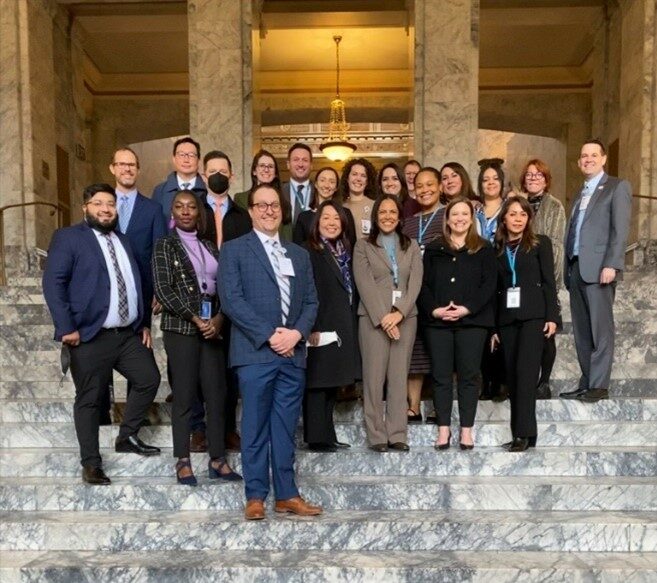State Lawmakers Pass Seattle Children’s Top Priority Bill to Change How WA Cares for Youth Stuck in Hospitals
5.25.2023 | Seattle Children's Press Team
 (Pictured left to right) Kashi Arora, Dr. Alysha Thompson, Dr. Sina Shah, Gov. Jay Inslee, Erika Boyd, Greta Johnson and Representative Lisa Callan
(Pictured left to right) Kashi Arora, Dr. Alysha Thompson, Dr. Sina Shah, Gov. Jay Inslee, Erika Boyd, Greta Johnson and Representative Lisa CallanMost people hope any trip to the emergency room will be a short stay, but many emergency rooms and hospitals in Washington, including Seattle Children’s, are where young people in crisis become stuck when they are unable to get connected to the kind of support they need.
Last summer and fall, Seattle Children’s convened with other hospital leaders and government agency officials to devise a legislative fix.
The group included representatives from the agencies that oversee, health, social services, child welfare, and education as well as the mental health policy lead in the governor’s office. They met for over six months before settling on many of the provisions outlined in what is now called House Bill (HB) 1580.
The 2023 Washington State Legislative Session adjourned in late April, after both the House and Senate unanimously passed HB 1580, and on May 11, Governor Jay Inslee signed the bill into law, putting hope on the horizon for some of the highest-risk children and families we serve.
Hugh Ewart, Senior Director, State and Federal Government Affairs, and Kashi Arora, Program Manager, Mental and Behavioral Health at Seattle Children’s, sat down with On the Pulse to discuss the behind-the-scenes of how HB 1580 came together and how it will help youth in crisis.
When did you begin to see the need for change in the way youth in crisis get connected with care?
Arora: The number of youth in crisis was rising before the pandemic, but really increased after the onset of COVID-19. While demand for care increased, access to behavioral health services shrank: School shutdowns cut off in-person special education programs, and several state and local programs stopped offering in-home therapy and family services.
The number of inpatient psychiatric beds for youth has decreased in the last few years and access to residential care is even harder. As more children and teens went without care, some experienced more serious crises and began to pose a threat to themselves or others. With limited crisis alternatives available, emergency rooms became the only safe place for youth in crisis.
What was not working in the process to get youth connected with care?
Ewart: Right now, no single state agency is responsible for finding appropriate psychiatric care for youth who are stuck inside the state’s hospitals, which is known as ‘boarding.’
The Department of Social and Health Services, for example, oversees access to a broad range of therapeutic, in-home and residential services for people with disabilities. But some related programs, like the Children’s Long-term Inpatient Program and intensive outpatient supports such as Wraparound with Intensive Services (WISe), are governed by a different agency, the Washington State Health Care Authority.
Individual school districts are tasked with other responsibilities, like enrolling youth in special education programs. And the Department of Children, Youth & Families (DCYF) provides preventative resources for families and oversees services for children in foster care. With so many players, piecing together the appropriate care for youth in crisis proved difficult for families and caseworkers alike.
How did you come up with the provisions outlined in HB 1580?
Arora: Like Hugh mentioned, there were many groups involved, so it was important to get representatives from all of them involved to come up with solutions. We met every other week for several months and looked for solutions from other states in order to determine the best path forward.
Ultimately ,where we landed is that we know more services are critically necessary for these children and their families, and we also need a new way of working together to ensure children are actually getting the care they need.

How did lawmakers react to HB 1580?
Ewart: Many thanks to bill sponsor Rep. Lisa Callan, D-Issaquah, who helped lead support for the bill – it earned strong bipartisan support, drawing in lawmakers with personal ties to the youth mental health crisis, and passed both in the House and Senate unanimously. Several other lawmakers including Reps. Tana Senn, D-Mercer Island and Carolyn Eslick, R-Sultan advocated within their caucuses to ensure the bill progressed through the legislature.
How will HB 1580 help youth in crisis get connected to the kind of support they need?
Ewart: HB 1580 centralizes responsibility for these youth in the governor’s office. It creates a new position called a multi-system care coordinator, who will be charged with creating a rapid care team and pooling state agency resources to help discharge children who are hospitalized but need outpatient psychiatric services or residential placement rather than hospital-level care. The coordinator will also have access to funds reserved to help find care or placement for kids with complex needs who can’t live at home.
Arora: I’m also excited that the team will be required to collect data about this process. This can help us identify barriers to care and understand what services are missing in our system.
When will the bill go into effect? Do you expect to see a decrease in boarding times right away, or will it take some time to work out the kinks in the new process?
Arora: Starting Jan. 1, 2024, we will be able to call this team when we identify a child who could be stuck in the hospital. We also know new processes take time to implement fully and well. I do think this puts hope on the horizon for some of the highest-risk children and families we serve, who are currently falling through the gaps in the systems.
I’m also excited that this victory will bring more support and resources for our colleagues on the frontlines who have been navigating these challenges. In addition to this bill, Seattle Children’s Government Affairs team advocated for a number of investments in child mental and behavioral health as well as child health generally that are included in the newly approved state budget.
We know there’s more work to be done and we’re excited that HB 1580 is a huge step in the right direction.